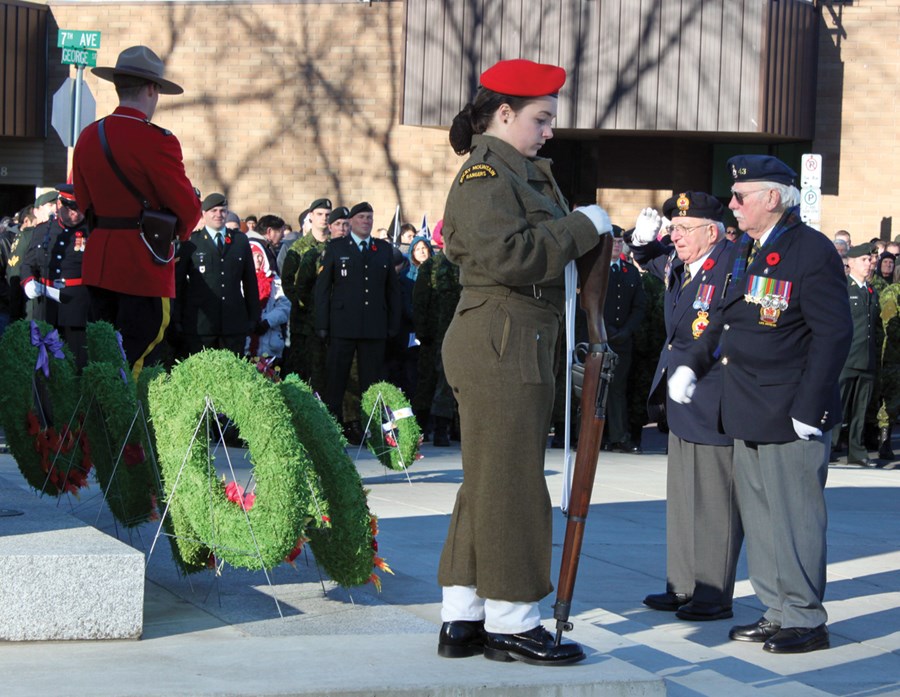John Kuharchuk was a 19-year-old Alberta farm boy when he joined the army, looking for adventure and a future beyond the farm.
When he arrived in England in March 1944, it was nothing like the fields of his youth.
"It was altogether completely different. Your life just changed," said the 90-year-old following Tuesday's Remembrance Day ceremonies.
A month after the historic D-Day landings, Kuharchuk was charging a much quieter Juno Beach, on July 7, 1944, but it was still months before the Allies could declare victory.
"We waited 'till the tide went out and then we walked to shore."
They moved in the dark of night, toward a battle which raged farther inland. Onward, past Caen, in Normandy.
"It was under rubble," he said, adding just beyond the city, "that's when the battle started."
For 10 months, Kuharchuk fought on the front lines, serving until the end of the war. Daily life for him was "dodging bullets and digging slick trenches and shooting at the enemy."
The anxiety of those moments never quite left.
"Your stomach tightens up and you just go on and do your thing," said Kuharchuk, adding sometimes you could see the men you were shooting at, but just as often they were targets of tanks and aerial bombardments. "You kind of lose your fear of what's going on around you. You fight the battle and you want to win the best way you know how."
During the moment of silence, sometimes his mind strays back to the battlefield, back to the days when he would be on the attack and around him, his friends were falling.
"People dropping dead or wounded. You can't help them. They're hurting and you can't help them so that kind of goes through your mind."
Kuharchuk escaped without much injury, though he was shell-shocked and lost hearing in both ears. That time, a grenade was tossed into the house where he was hunkered over a machine gun.
Often he was the senior fighter in a platoon of 20 men.
"I was lucky," he said.
Kuharchuk and Armand Denicola, also a Second World War veteran, were recognized during Prince George's packed ceremony Tuesday.
"They came home to us," MLA Shirley Bond told a crowd of more than 1,500 people who filled the seats and lined the walls at the Civic Centre.
"For some it is hard to feel connected to a world war that took place 100 years ago," said Bond of the First World War.
At her back, images flickered across the stage, alternating between service men and women.
With each second, another image. A man staring at the camera through a gas mask. A tank, its tracks deep in mud. Blue skies over lime green fields. Soldiers in sand dunes. A soldier bent as if whispering to a girl. A white cross made crimson with poppies.
Seventy-five years ago marked the launch of the Second World War, Bond said, and just over 20 days since Warrant Officer Patrice Vincent was killed in a Quebec hit-and-run attack and Cpl. Nathan Cirillo was gunned down in Ottawa.
"In many ways the terrifying events that captured a nation just two weeks ago have stirred and compelled a new sense of gratitude for those who serve our country," Bond said. "We need to connect the past and the present."
That connection is written into Prince George's cenotaph. A lone name is etched under the word "Afghanistan," commemorating Darren James Fitzpatrick. He was 21 years old when he was killed in action in March 2010.
The city paid to add the inscription after the family pushed for his inclusion.
"It took too long," Mayor Shari Green told the crowd, apologizing to the family.
Fitzpatrick's mother Colleen said it was nice to see his name recognized with the others.
"It's nice to know the people remember the sacrifice and just overall to see the turnout today, it really goes to show that what he believed in, other people see it and recognize it," she said.



